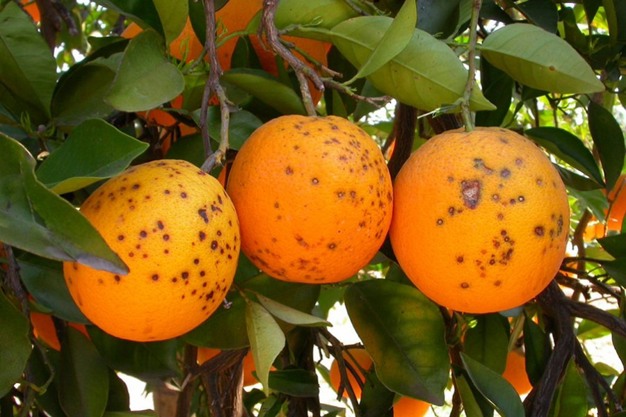The Valencian Farmers' Association (AVA-Asaja) has warned of the "high, intolerable phytosanitary risk" posed by citrus imports from Mercosur countries, especially from Argentina, Brazil, and Uruguay. It issued the warning following the release of a report by the European Commission's TRACES platform for July, which states that these three Mercosur states accumulated a total of 26 interceptions of citrus shipments to Europe infested with quarantine pests and diseases, such as black spot (Phyllosticta citricarpa), citrus bacterial canker (Xanthomonas citri) and the Elsinoë fungus that causes citrus scab.
Last month, the Community ports of entry detected 21 cases in citrus from Argentina (three interceptions of black spot on oranges and four on lemons, and 13 of Xanthomonas citri on lemons), three cases in citrus shipments from Brazil (two of Xanthomonas citri on limes, and one of Elsinoë on limes), and two cases in citrus fruits from Uruguay (one of black spot on oranges and one on lemons).
 © AVA-ASAJA
© AVA-ASAJA
The association also stated that, in July, the EU had intercepted three citrus shipments from South Africa and Swaziland contaminated with black spot. Specifically, South African citrus adds two more cases of this quarantine disease in grapefruit, while neighboring Swaziland has one more case also in a consignment of grapefruits. With the interceptions in July, South Africa has already accumulated eight cases of black spot this year, confirming the trend of recent seasons.
In addition, the EC recorded a detection of Scirtothrips aurantii - the new thrips that has become the most harmful pest in Valencian agriculture - in a shipment of aubergines from South Africa. This corroborates that the pest that arrived in Europe due to inadequate border controls originated from South Africa.
The organization chaired by Cristóbal Aguado is demanding that EU institutions and Member States tighten up phytosanitary controls on citrus imports from third countries, which, "given the objective data from the European Commission itself, are proving to be incapable of guaranteeing the phytosanitary safety of their citrus." In the case of the Mercosur countries that are at the head of quarantine-pest-and-disease interceptions, AVA-Asaja reiterates its demand that "the EU reconsider signing a future treaty with Mercosur without having the necessary guarantees to protect the European agricultural sector's plant and animal health."
Regarding the countries of southern Africa, it asks Brussels to re-establish in its regulations a maximum number of detections of a certain disease or pest, above which, depending on the risk that EFSA scientists consider unacceptable, the borders should be closed to imports from a third country.
 For more information:
For more information:
AVA-Asaja
Email: [email protected]
www.avaasaja.org
